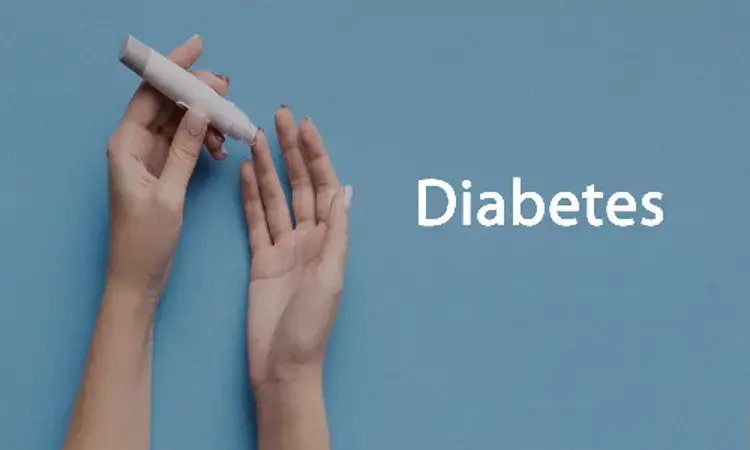- Home
- Medical news & Guidelines
- Anesthesiology
- Cardiology and CTVS
- Critical Care
- Dentistry
- Dermatology
- Diabetes and Endocrinology
- ENT
- Gastroenterology
- Medicine
- Nephrology
- Neurology
- Obstretics-Gynaecology
- Oncology
- Ophthalmology
- Orthopaedics
- Pediatrics-Neonatology
- Psychiatry
- Pulmonology
- Radiology
- Surgery
- Urology
- Laboratory Medicine
- Diet
- Nursing
- Paramedical
- Physiotherapy
- Health news
- Fact Check
- Bone Health Fact Check
- Brain Health Fact Check
- Cancer Related Fact Check
- Child Care Fact Check
- Dental and oral health fact check
- Diabetes and metabolic health fact check
- Diet and Nutrition Fact Check
- Eye and ENT Care Fact Check
- Fitness fact check
- Gut health fact check
- Heart health fact check
- Kidney health fact check
- Medical education fact check
- Men's health fact check
- Respiratory fact check
- Skin and hair care fact check
- Vaccine and Immunization fact check
- Women's health fact check
- AYUSH
- State News
- Andaman and Nicobar Islands
- Andhra Pradesh
- Arunachal Pradesh
- Assam
- Bihar
- Chandigarh
- Chattisgarh
- Dadra and Nagar Haveli
- Daman and Diu
- Delhi
- Goa
- Gujarat
- Haryana
- Himachal Pradesh
- Jammu & Kashmir
- Jharkhand
- Karnataka
- Kerala
- Ladakh
- Lakshadweep
- Madhya Pradesh
- Maharashtra
- Manipur
- Meghalaya
- Mizoram
- Nagaland
- Odisha
- Puducherry
- Punjab
- Rajasthan
- Sikkim
- Tamil Nadu
- Telangana
- Tripura
- Uttar Pradesh
- Uttrakhand
- West Bengal
- Medical Education
- Industry
Artificial intelligence may adjust insulin dose to effectively manage type 1 diabetes

Researchers and physicians at Oregon Health & Science University, using artificial intelligence and automated monitoring, have designed a method to help people with type 1 diabetes better manage their glucose levels.
The research was published in the journal Nature Metabolism.
People with type 1 diabetes do not produce their own insulin, so they must take it continuously through the day using an insulin pump or through multiple daily injections.
"Our system design is unique," said lead author Nichole Tyler, an M.D.-Ph.D. student in the OHSU School of Medicine. "We designed the AI algorithm entirely using a mathematical simulator, and yet when the algorithm was validated on real-world data from people with type 1 diabetes at OHSU, it generated recommendations that were highly similar to recommendations from endocrinologists."
That's significant because the people with diabetes typically go three to six months between appointments with their endocrinologist.
In that time, they can be at risk of dangerous complications if glucose levels in their blood rise too high or fall too low. People with type 1 diabetes do not produce their own insulin, so they must take it continuously through the day using an insulin pump or through multiple daily injections. The algorithm developed by OHSU scientists uses data collected from a continuous glucose monitor and wireless insulin pens to provide guidance on adjustments.
Paired with a smart phone app called DailyDose, the recommendations from the algorithm were shown to be in agreement with physicians 67.9% of the time.
The new study involved monitoring 16 people with type 1 diabetes over the course of four weeks, showing that the model can help reduce hypoglycemia, or low glucose. If left untreated, hypoglycemia can cause coma or death.
The engine was developed in a collaboration between the OHSU Harold Schnitzer Diabetes Health Center and the Artificial Intelligence for Medical Systems Lab led by Peter Jacobs, Ph.D., associate professor of biomedical engineering in the OHSU School of Medicine.
"There are other published algorithms on this, but not a lot of clinical studies," said Jacobs, senior author on the study. "Very few have shown a statistically relevant outcome - and most do not compare algorithm recommendations with those of a physician. In addition to showing improvement in glucose control, our algorithm generated recommendations that had very high correlation with physician recommendations with over 99% of the algorithm's recommendations delivered across 100 weeks of patient testing considered safe by physicians."
OHSU intends to continue to advance the technology.
"We have plans over the next several years to run several larger trials over eight and then 12 weeks and to compare DailyDose with other insulin treatment strategies, including automated insulin delivery," said co-author Jessica Castle, M.D., associate professor of medicine (endocrinology, diabetes and clinical nutrition) in the OHSU School of Medicine.
Hina Zahid Joined Medical Dialogue in 2017 with a passion to work as a Reporter. She coordinates with various national and international journals and association and covers all the stories related to Medical guidelines, Medical Journals, rare medical surgeries as well as all the updates in the medical field. Email: editorial@medicaldialogues.in. Contact no. 011-43720751
Dr Kamal Kant Kohli-MBBS, DTCD- a chest specialist with more than 30 years of practice and a flair for writing clinical articles, Dr Kamal Kant Kohli joined Medical Dialogues as a Chief Editor of Medical News. Besides writing articles, as an editor, he proofreads and verifies all the medical content published on Medical Dialogues including those coming from journals, studies,medical conferences,guidelines etc. Email: drkohli@medicaldialogues.in. Contact no. 011-43720751


